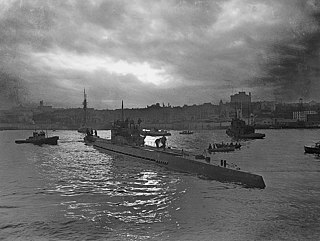Related Research Articles
Several Canadian naval units have been named HMCS Halifax.
Several Canadian naval units have been named HMCS Vancouver. One was named for the explorer George Vancouver, the others after the city of Vancouver.

HMCS Glace Bay is a Kingston-class coastal defence vessel that has served in the Canadian Forces and Royal Canadian Navy since 1996. Glace Bay is the second ship of her class which is the name for the Maritime Coastal Defence Vessel Project. She is the second vessel to use the designation HMCS Glace Bay. She is assigned to Maritime Forces Atlantic (MARLANT) and is homeported at CFB Halifax.
Several Canadian naval units have been named HMCS Calgary.
Several Canadian naval units have been named HMCS Charlottetown after the provincial capital of Prince Edward Island. Uniquely in Canadian naval history, two of these vessels had the same name and pennant number.
Four Canadian naval units have been named HMCS Ottawa.
Several Canadian naval units have been named HMCS Regina.
Several Canadian naval units have been named HMCS Ville de Quebec.
HMCS Cape Breton is a name used by several ships of the Royal Canadian Navy:

HMCS Shawinigan is a Kingston-class coastal defence vessel that has served in the Canadian Forces and the Royal Canadian Navy since 1997. Shawinigan is the fifth ship of her class. She is the second vessel to use the designation HMCS Shawinigan. The ship is assigned to Maritime Forces Atlantic (MARLANT) and is homeported at CFB Halifax.

The Battle of the St. Lawrence involved marine and anti-submarine actions throughout the lower St. Lawrence River and the entire Gulf of Saint Lawrence, Strait of Belle Isle, Anticosti Island and Cabot Strait from May–October 1942, September 1943, and again in October–November 1944. During this time, German U-boats sank over 20 merchant ships and four Canadian warships. There were several near-shore actions involving the drop of German spies, or the attempted pickup of escaping prisoners of war. Despite the 23 ships lost, this battle marked a strategic victory for Canadian forces as ultimately they managed to disrupt U-boat activity, protect Canadian and Allied convoys, and intercept all attempted shore operations. This marked the first time that a foreign power had inflicted casualties in Canadian inland waters since the US incursions in the War of 1812.
Several units of the Royal Canadian Navy have been named HMCS Kitchener.
Several Canadian naval units have been named HMCS Nipigon.
Several Canadian naval units have been named HMCS Moncton.
Several Canadian naval units have been named HMCS Summerside.

Western Local Escort Force (WLEF) referred to the organization of anti-submarine escorts for World War II trade convoys from North American port cities to the Western Ocean Meeting Point near Newfoundland where ships of the Mid-Ocean Escort Force (MOEF) assumed responsibility for safely delivering the convoys to the British Isles.
Shawinigan is a city located on the Saint-Maurice River in the Mauricie area in Quebec, Canada.

HMCS Shawinigan was a Flower-class corvette that served with the Royal Canadian Navy during the Second World War. She served primarily in the Battle of the Atlantic protecting convoys. She was sunk in 1944. She was named for Shawinigan, Quebec.

HMCS Trail was a Flower-class corvette that served with the Royal Canadian Navy during the Second World War. She served primarily in the Battle of the Atlantic as a convoy escort. She was named for Trail, British Columbia.
Several units of the Royal Canadian Navy have been named HMCS Granby.
References
- Directorate of History and Heritage – HMCS Shawinigan Archived 2014-10-06 at the Wayback Machine